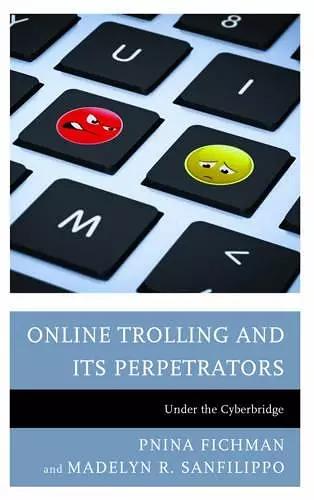Online Trolling and Its Perpetrators
Under the Cyberbridge
Pnina Fichman author Madelyn R Sanfilippo author
Format:Hardback
Publisher:Bloomsbury Publishing PLC
Published:11th Apr '16
Currently unavailable, our supplier has not provided us a restock date

Online trolling and other deviant behaviors have always affected online communities. As online trolling becomes widely spread, myriad questions are raised, including: ·Who is a troll and why do trolls troll? ·What are the enabling factors of online trolling? ·How do members and administrators of online communities detect, interpret, and react to trolling? How can online trolling be handled effectively? ·What is the impact of the socio-cultural and technological environments on online trolling? ·What motivates trolling? The book answers these questions and includes the following focuses: ·Hard-core trolls and light trolls ·Gender, trolling, and anti-social behavior online ·Perception of trolling ·Collaborative trolling ·Ideological trolls ·Trolling around the globe
‘Trolling’ is an online interaction that is meant to insult or offend, and is primarily intended to provoke others. In mass media journalism, trolling is purely presented as a social deviance, and specifically as evidence that online interaction has the potential to cultivate the worst in individuals. Online trolls have provoked suicides and even harassed the suffering families after a suicide. Fichman and Sanfilippo provide a nuanced analysis of how trolls and their activities are understood by young adults—emphasizing that trolling is an intentional behavior. Superficially, similar provocations can be experienced as humorous in a social context, but offensive and misleading in an educational context. Trolling can be abusive and distracting, but it can also pointedly challenge social norms and incumbent power. By provocatively twisting the truth, trolling evokes critical thinking. A skilled troll can steer narrowly between humor and offense, so that one cannot be certain that the interaction truly is trolling. The authors’ thorough analysis of trolling and their emphasis on literature review and empirical studies are strengths. . . .Summing Up: Recommended. Upper-division undergraduates and graduates students, especially those in the social and information sciences. * CHOICE *
[T]he authors offer nuanced explanations of the behaviors and motivations associated with trolling, provide numerous case studies to illuminate the practice’s many facets, and present the results of their thoughtful ethnographic research. . . .This text proves to be an excellent resource and a solid contribution to studies of social informatics and online communities through its ethnographic research, with near-exhaustive citation of past scholarship. . . .[The book] offers clear evidence to delineate between trolling and more serious forms of online deviance. * International Journal of Communication *
ISBN: 9781442238503
Dimensions: 237mm x 160mm x 21mm
Weight: 490g
216 pages